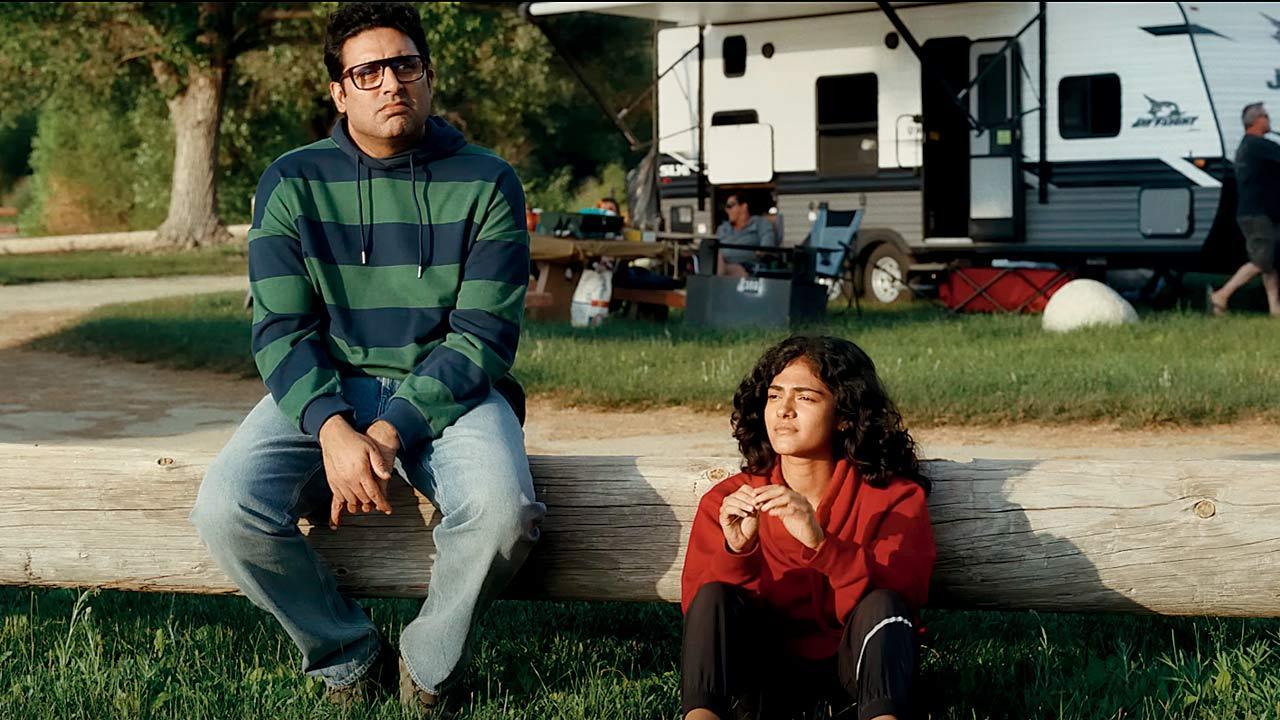The Abhishek Bachchan-starrer isn’t so much about suffering as survival, really—for a man who’s tricked his brain into believing that he can physically overcome

A still from I Want To Talk
Film: I Want To Talk
U/A: Family drama
Dir: Shoojit Sircar
Cast: Abhishek Bachchan, Ahilya Bamroo
Rating: 3/5
ADVERTISEMENT
I Want To Talk (IWTT) is an American film. For the setting, first, of course. That is, an idyllic smallish town (perhaps City of Hemet, in California). Wherein the middle-aged lead, Arjun Sen, resides. Living the so-called great American professional, consumerist, expatriate, suburban dream.
Sen, of course, is Bengali by origin. He’s the typical IIT-IIM high-potential, go-getter, who would’ve moved to the US, I’m guessing, around mid-to-late ’90s, or early 2000s—during the high-noon of high-income group, Y2K, young desi migration into America, as it were.
They collectively assimilated so seamlessly into upper echelons of society a generation later, that a film about them can be easily viewed as an out-and-out American movie, in 2024. Rather than a niche flick on the Indian diaspora. Which was more the case in the ’90s, if you recall those ABCD (American Born Confused Desi) pictures.
That said, IWTT is a Shoojit Sircar film. Sircar, 57, being the rare auteur who, upon success, hasn’t lost his voice to the mundaneness of the bloated, screechy mainstream, where he unabashedly operates in; but on his own terms.
Whether working with leading film stars, Amitabh Bachchan, Deepika Padukone (Piku), Varun Dhawan (October), or even achieving/aiming for theatrical gold, say, Madras Café (2013), Vicky Donor (2012).
That voice is chiefly simple, unpretentious, gentle, genteel; borderline ‘bhadralok’, in this case. Given the Bong protagonist who, on the face of it, possesses qualities most opposite to the obviously heroic. The hero is perennially sick, hence frail. He’s single, from a marriage that’s failed.
And while he was once a clever go-getter, professionally, one can’t imagine him going too far on that front either, when he’s been through countless surgeries, over multiple years, after being first diagnosed with laryngeal cancer, supposedly left with 100 days to go.
In super-hero movie terms, this guy is kinda far-off equivalent of Samuel Jackson from M Night Shyamalan’s Unbreakable (2000)—tearing into parts, but resilient; fragile, but holding up; battered, beaten, bruised, but functional.
What adds to the subversion is the film, written by Ritesh Shah (Pink, Sardar Udham), is based on a true story. Making the lead even less likely for a Bollywood biopic, that usually chronicles larger-than-life heavy hitters.
The greatest thing about Arjun Sen is he’s a fine father. That should be good enough. Not instantly so in the movies, though. Actor Abhishek Bachchan plays this Bong Arjun. Abhishek is half-Bong himself (mother: Jaya Bhaduri).
But that’s not a card he overplays for the part. In fact, and you could credit him for this, throughout, as a performer (in general)—he doesn’t overplay. Period. He shows up, instead of insecurely showing off.
Keeping it quiet and simple. Like the film itself, that sails on the music of Arunachali composer Taba Chake for an emotional tug or two.
This also helps Abhishek jam with co-actors with relative ease. He’s got that going here with on-screen daughter—teen debutant, Ahilya Bamroo, who I recognised straightaway, from Instagram. I’ve been a fan of her reels/posts, mimicking global accents, for long.
I don’t know if that’s where she got cast from. This is the best crossover between popular cinema and social media since, well, I don’t know—mostly trash get picked from among YouTube/Insta influenza.
Is IWTT about this father-daughter relationship? Somewhat, yes, although you wish it hit deeper—like those fully realised melancholic scenes between the Bengali father, Irrfan, and his boy, in The Namesake (2006).
Hard to tell why. Maybe because this is ‘Piku’ Sircar’s film. Can’t help but think Irrfan. The movie isn’t so much about suffering as survival, really—for a man who’s tricked his brain into believing that he can physically overcome.
How else do you explain someone moving from surgery, radiotherapy, chemotherapy, heart attack… Medicine is not an exact science. Most champions beat diseases, by their sheer zeal to live. Although surgeries, as per a beautiful line here, is like sudden death in football: the doctor scores, you win.
All said, IWTT is a film then about life itself. Its randomness, to start with. As you observe a perfectly fine gent—maybe the hyper-ambitious Abhishek from that movie, Om Jai Jagadish (2002), who moved to the US, found all that he wanted—but got hit by an accident called health, that nobody can anticipate.
He punts, on himself, still—all along going through a physical transformation; staying mentally stable. The only person who takes surgeries as lightly is usually a surgeon (charming Jayant Kripalani).
This can’t be easy.
But shouldn’t it be? For, what’s life if not a terminal illness in itself. We’re all gonna die, anyway. Guess we live, until then; no? Maybe that’s the only point/purpose there is.
Is there a deeply spiritual side to this pic’s protagonist—does he pray, meditate; is he agnostic, existentialist, atheist…? Does he feel lonely? I couldn’t glean, right away. He’s certainly not much of a self-help quote-meister, which is a relief.
I watched IWTT at a preview screening, almost a week before its release. Which tells you how confident the filmmakers are of what they’ve made. And, no, they’re anything but delulu. It’s just a movie, initially low on energy, that gently grows on you, post-interval, when the penny drops. Felt like watching it again while writing this.
Surely, there’s another layer to peel. Will wait for it to drop on OTT (Prime Video). Until then, may I generously guide you to a theatre, where it’s playing near you.
 Subscribe today by clicking the link and stay updated with the latest news!" Click here!
Subscribe today by clicking the link and stay updated with the latest news!" Click here!







